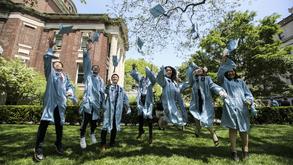 In this May 22, 2019 photo, graduate students from China pose for photos on campus after the Columbia University Commencement ceremony in New York, the United States. (WANG YING / XINHUA)
In this May 22, 2019 photo, graduate students from China pose for photos on campus after the Columbia University Commencement ceremony in New York, the United States. (WANG YING / XINHUA)
WASHINGTON - Education exchanges will remain an essential impetus for China-US mutually beneficial cooperation in the future, even though some US politicians' Cold War mentality and ideological bias have pushed the bilateral ties to the edge, a senior Chinese diplomat has said.
Yang Xinyu, minister counselor for educational affairs at the Chinese Embassy in the United States, made the remarks when Julia Chang Bloch, president of the DC-based nonprofit US-China Education Trust, asked if she sees hope for international education between China and the United States to return to normal in 2021.
Yang Xinyu, minister counselor for educational affairs at the Chinese Embassy in the United States, made the remarks when Julia Chang Bloch, president of the DC-based nonprofit US-China Education Trust, asked if she sees hope for international education between China and the United States to return to normal in 2021
"I always believe that trust can be built through education and culture," Yang said in their recent conversation.
"Last year was the 40th anniversary of China-US diplomatic relations. We also celebrated 40 years of China-US student exchange. Forty years have proved that educational exchanges benefit China and the United States at the same time," she said.
Calling educational exchanges "the fundamental power of the over-all relations between the two countries," Yang said cooperation is the only option for the prosperity of both countries and for addressing common challenges to all mankind.
ALSO READ: US urged to stop discrimination against Chinese students
"And student exchange will, as always, facilitate such cooperation," she added.
"Things and people around me make me have that belief," said Yang.
"When I wrote to university presidents of the eight states that were formerly served by the Chinese Consulate General in Houston, I got instant response from presidents of universities like Rice and Wesleyan, reassuring me their commitment to Chinese students on campus and interest in cooperating with China," she said.
"Among federal concerns over China, I read from news that Bryant University explicitly told media that they had no plans to close the US-China Institute on their campus," she said.
The Chinese embassy in the United States are also making every effort to facilitate exchanges, Yang said.
READ MORE: Parents hesitate over sending children to US for education
According to the senior Chinese diplomat, over 700 students of New York University Shanghai were granted special approval to return to China for the fall semester. Faculty from Duke University were also able to go back to Duke Kunshan University despite the border control due to the pandemic.
The Tianjin Juilliard School, Juilliard's first overseas branch campus, began its first enrollment in 2020, and 15 students from the United States successfully arrived in Tianjin for the new academic year.
"In 2019, the American Short-Term Study in China Initiative was launched. I believe American students will get to benefit from it whenever the situation allows," said Yang.
"Stories continue. People never stop moving forward. Those who shut their doors will lose the game. I have faith for the future. And I know that you all have," she said.
The American Association of State Colleges and Universities celebrated their 20th anniversary of collaboration with the China Education Association for International Exchange, she said.
READ MORE: Chinese students feel at home with Edinburgh guide
Moreover, Tsinghua University and Yale University cohosted the China-US 10+10 University Presidents Forum. China-US-Canada Career and Technical Education Dialogue was held online.
"Universities, higher education organizations and those who support international education are all engaging in a global dialogue of where higher education should go and what we can do," she said.
"Here in Washington, DC, for the Chinese traditional holiday Mid-Autumn Festival, Chinese and US young musicians presented a virtual concert and students from the two countries shared their experience of studying in the other's country," Yang added.


